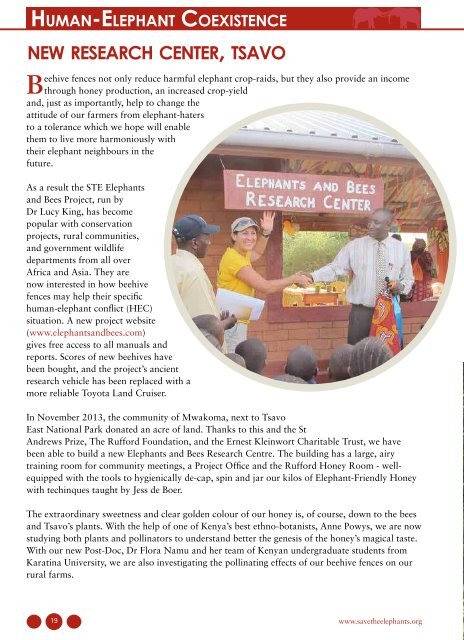2014_STEAnnualReport
2014_STEAnnualReport
2014_STEAnnualReport
Create successful ePaper yourself
Turn your PDF publications into a flip-book with our unique Google optimized e-Paper software.
Human-Elephant Coexistencenew research center, tsavoBeehive fences not only reduce harmful elephant crop-raids, but they also provide an incomethrough honey production, an increased crop-yieldand, just as importantly, help to change theattitude of our farmers from elephant-hatersto a tolerance which we hope will enablethem to live more harmoniously withtheir elephant neighbours in thefuture.As a result the STE Elephantsand Bees Project, run byDr Lucy King, has becomepopular with conservationprojects, rural communities,and government wildlifedepartments from all overAfrica and Asia. They arenow interested in how beehivefences may help their specifichuman-elephant conflict (HEC)situation. A new project website(www.elephantsandbees.com)gives free access to all manuals andreports. Scores of new beehives havebeen bought, and the project’s ancientresearch vehicle has been replaced with amore reliable Toyota Land Cruiser.elephants and bees reach sri lankaWith the growing success of our Elephants and Bees Project in Africa there has beenincreasing interest from elephant projects in Asia to see if we can export our beehive fenceidea to help protect Asian farmers from Asian crop-raiding elephants. Sri Lanka has almost 6,000elephants packed onto a relatively small island. The human-elephant conflict issues are severe andwill only increase as development and human expansion grows in this post-war country.Essential to our research is trying to understand how Asian elephants will respond to Asian honeybees, Apis cerana indica. We know they are less aggressive than their African honey bee cousins,Apis mellifera scutellata, but its possible that elephants may still prefer to avoid their stings.As a testing ground for the rest of Asia, we have started two research projects in Sri Lanka. First,we have teamed up with Dr Shermin de Silva and her team at the Uda Walawe Research Project.In June <strong>2014</strong>, Dr Lucy King spent a month in Uda Walawe National Park trying to understandhow elephants react to the sound of disturbed honeybees, as well as take the chance to learn moreabout Asian elephant social structure, foraging behaviour, and to observe a famous “dwarf” bullelephant who lives in the park.Secondly, our new PhD student, Kylie Butler from Newcastle University in Australia, has joinedour team to assess if communities next to Wasgamuwa National Park may be interested in tryingbeehive fences as one deterrent method to stop the many crop-raiding elephants that cause havocin the harvesting season. In partnership with the Sri Lankan Wildlife Conservation Society, Kyliewill spend the next 3 years studying the elephants in this stunning area of the island.In November 2013, the community of Mwakoma, next to TsavoEast National Park donated an acre of land. Thanks to this and the StAndrews Prize, The Rufford Foundation, and the Ernest Kleinwort Charitable Trust, we havebeen able to build a new Elephants and Bees Research Centre. The building has a large, airytraining room for community meetings, a Project Office and the Rufford Honey Room - wellequippedwith the tools to hygienically de-cap, spin and jar our kilos of Elephant-Friendly Honeywith techinques taught by Jess de Boer.The extraordinary sweetness and clear golden colour of our honey is, of course, down to the beesand Tsavo’s plants. With the help of one of Kenya’s best ethno-botanists, Anne Powys, we are nowstudying both plants and pollinators to understand better the genesis of the honey’s magical taste.With our new Post-Doc, Dr Flora Namu and her team of Kenyan undergraduate students fromKaratina University, we are also investigating the pollinating effects of our beehive fences on ourrural farms.19 www.savetheelephants.orgSECURING A FUTURE FOR ELEPHANTS21


